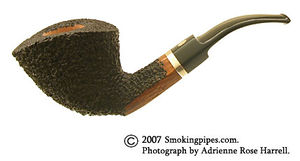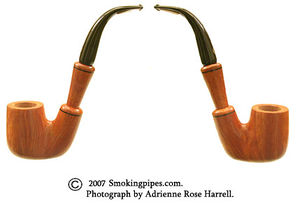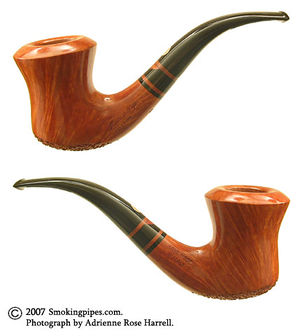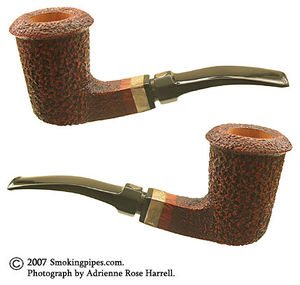Mastro de Paja: Difference between revisions
(New page: Article Courtesy of [http://www.smokingpipes.com/ Smokingpipes.com] left|thumb|Copyright Smokingpipes.com [[Image:Mastro de Paja Pipe02.jpg|right|thumb|...) |
No edit summary |
||
| Line 1: | Line 1: | ||
[[Image:Mastro de Paja Pipe01.jpg|left|thumb|Copyright Smokingpipes.com]] | [[Image:Mastro de Paja Pipe01.jpg|left|thumb|Copyright Smokingpipes.com]] | ||
The genesis of Mastro de Paja is one of the most peculiar ones in pipe history. Mastro de Paja was brought into being by a "consortium" of passionate pipesmokers, who had rallied around '''Terenzio Cecchini'''. They felt bitterly unhappy observing the general decline of the Italian and the rapid ascent of the Danish pipe in the 1960s and to beard this they set their mind on creating a new and great Italian pipe brand for high-value pipes. After all, a very patriotic and honorably intention. All these gentlemen were successful, well, wealthy to rich businessmen, but none of them possessed any knowledge or experience in pipe making or in pipe business. Finally this circle of amici elected Cecchini to be the CEO and left it to him to find a suitable pipe expert and get the pipe fabrication started. Cecchini began to search and in 1970 he bumped into '''Giancarlo Guidi'''. | |||
At that point of time Guidi was a real Mr. Nobody. He had begun to make his own pipes as a pure autodidact when he was a student of fine arts and design. Afterwards he couldn't find an employment in his profession and so he had decided to live on his talent as a pipe maker. Equipped with a band saw, a sanding disk and a belt sander, all age-worn and no longer very dependably, he succeeded to do so after a fashion. Guidi yielded to persuasion and joined the adventurous project. The foundation of the company was concluded and the amici provided some money. Cecchini was responsible for the management and Guidi, entering as a partner and not only as an employee, was appointed director of production. One more year passed, but in 1972 a workshop was finally furnished in Pesaro, almost exactly in the middle between Rome and Venice on the Adriatic sea. The pipe production could begin! | |||
[[Image:Mastro de Paja Pipe02.jpg|right|thumb|Copyright Smokingpipes.com]] | [[Image:Mastro de Paja Pipe02.jpg|right|thumb|Copyright Smokingpipes.com]] | ||
In spite of this kinda crazy origin Mastro de Paja became the nucleus of the pipe center Pesaro and what today is called the Pesaro school, boasting so many famous brands such as [[Il Ceppo]], [[Ser Jacopo]], [[Don Carlos]], [[Rinaldo]], [[Le Nuvole]] or [[L'Anatra]]. And Giancarlo Guidi became the foster-father of all these pipe makers - certainly not his least merit! | |||
Guidi put himself to work with ardor. Yet he was far from being an experienced and seasoned, even less a famous pipemaker. He worked eagerly on his own pipes and their permanent improvement. Beside that Guidi was much underway in order to find and to win young, promising talents. He should prove to be a golden boy in this metier. His first big haul was '''Bruto Sordini''' (today Don Carlos) in 1974. Sordini remained at Mastro de Paja until 1979. Likewise in 1974 Guidi hired two 16 and 14 years old fellows coming from Sicily. The brothers '''Elio and Guido Rinaldo''' quickly proved high talent and especially a fine sense for good design. They left in 1987 in order to work independently. | |||
To be continued! | |||
---- | |||
Article Courtesy of [http://www.smokingpipes.com/ Smokingpipes.com] | |||
'''Mastro de Paja''' was founded in 1972 in '''Pesaro''', '''Italy''', the great center of North Italian pipe making. On the Adriatic sea, almost exactly between Rome and Venice, Pesaro has grown to be one of the centers of pipemaking in Italy, boasting pipe producers such as [[Ser Jacapo]], [[Castello]], [[Il Ceppo]] and [[L'Anatra]]. | '''Mastro de Paja''' was founded in 1972 in '''Pesaro''', '''Italy''', the great center of North Italian pipe making. On the Adriatic sea, almost exactly between Rome and Venice, Pesaro has grown to be one of the centers of pipemaking in Italy, boasting pipe producers such as [[Ser Jacapo]], [[Castello]], [[Il Ceppo]] and [[L'Anatra]]. | ||
Revision as of 19:58, 9 March 2008
The genesis of Mastro de Paja is one of the most peculiar ones in pipe history. Mastro de Paja was brought into being by a "consortium" of passionate pipesmokers, who had rallied around Terenzio Cecchini. They felt bitterly unhappy observing the general decline of the Italian and the rapid ascent of the Danish pipe in the 1960s and to beard this they set their mind on creating a new and great Italian pipe brand for high-value pipes. After all, a very patriotic and honorably intention. All these gentlemen were successful, well, wealthy to rich businessmen, but none of them possessed any knowledge or experience in pipe making or in pipe business. Finally this circle of amici elected Cecchini to be the CEO and left it to him to find a suitable pipe expert and get the pipe fabrication started. Cecchini began to search and in 1970 he bumped into Giancarlo Guidi.
At that point of time Guidi was a real Mr. Nobody. He had begun to make his own pipes as a pure autodidact when he was a student of fine arts and design. Afterwards he couldn't find an employment in his profession and so he had decided to live on his talent as a pipe maker. Equipped with a band saw, a sanding disk and a belt sander, all age-worn and no longer very dependably, he succeeded to do so after a fashion. Guidi yielded to persuasion and joined the adventurous project. The foundation of the company was concluded and the amici provided some money. Cecchini was responsible for the management and Guidi, entering as a partner and not only as an employee, was appointed director of production. One more year passed, but in 1972 a workshop was finally furnished in Pesaro, almost exactly in the middle between Rome and Venice on the Adriatic sea. The pipe production could begin!
In spite of this kinda crazy origin Mastro de Paja became the nucleus of the pipe center Pesaro and what today is called the Pesaro school, boasting so many famous brands such as Il Ceppo, Ser Jacopo, Don Carlos, Rinaldo, Le Nuvole or L'Anatra. And Giancarlo Guidi became the foster-father of all these pipe makers - certainly not his least merit!
Guidi put himself to work with ardor. Yet he was far from being an experienced and seasoned, even less a famous pipemaker. He worked eagerly on his own pipes and their permanent improvement. Beside that Guidi was much underway in order to find and to win young, promising talents. He should prove to be a golden boy in this metier. His first big haul was Bruto Sordini (today Don Carlos) in 1974. Sordini remained at Mastro de Paja until 1979. Likewise in 1974 Guidi hired two 16 and 14 years old fellows coming from Sicily. The brothers Elio and Guido Rinaldo quickly proved high talent and especially a fine sense for good design. They left in 1987 in order to work independently.
To be continued!
Article Courtesy of Smokingpipes.com
Mastro de Paja was founded in 1972 in Pesaro, Italy, the great center of North Italian pipe making. On the Adriatic sea, almost exactly between Rome and Venice, Pesaro has grown to be one of the centers of pipemaking in Italy, boasting pipe producers such as Ser Jacapo, Castello, Il Ceppo and L'Anatra.
The history of Mastro de Paja really begins in 1985 with the arrival of Alberto Montini as the factory manager. Mastro de Paja had been created by Terenzio Cecchini and friends of his, all of whom were successful businessmen. Being pipe smokers, they wanted to build a new brand of high-quality pipes. The famed Giancarlo Guidi, now maker of Ser Jacapo pipes, was involved in the company from 1970 to 1982 also. In 1982 Guidi left to make Ser Jacapo pipes. None of them had considerable experience in the pipe industry, except Guidi, who had left in 1982. All worked well, in spite of Guidi's departure, until the decline in demand for pipes in Italy during the early 1980s.
At this point, Cecchini sought out a new manager for the factory to turn it around. His answer to the problem was Alberto Montini (for whom the line of seconds, Montini pipes, is named). He refocused the company overseas and implemented closer quality control by reducing output and focusing more closely on quality rather than quantity.
Following a few years of success, Cecchini disappeared. No one knew where he was and he never showed up again. After considerable wrangling with his heirs, Alberto Montini secured complete ownership of Mastro de Paja.
The key to Mastro de Paja is the family feeling that pervades the factory. Montini's wife, Cinzia, works on the workshop floor (mostly sanding and finishing the pipes) and various cousins and uncles do most of the actual carving. Mario Pascucci and Vittorio del Vecchio are the most senior carvers and are both extremely close to the Montini family. Most of the rest of the factory is somehow related to one of these four principle characters.
Mastro de Paja pipes truly exhibit their Pesaro heritage, but tend to err on the side of classical more than some of the other brands made in the city, but the neoclassical flair for which the Pesaro school is known is certainly pronounced. They're partial rusticated or 'Unica' finish is particularly distinctive and has become somewhat of a trademark finish for the brand in the United States. Regardless, Mastro de Paja manages to produce excellent Italian pipes at reasonable prices.



